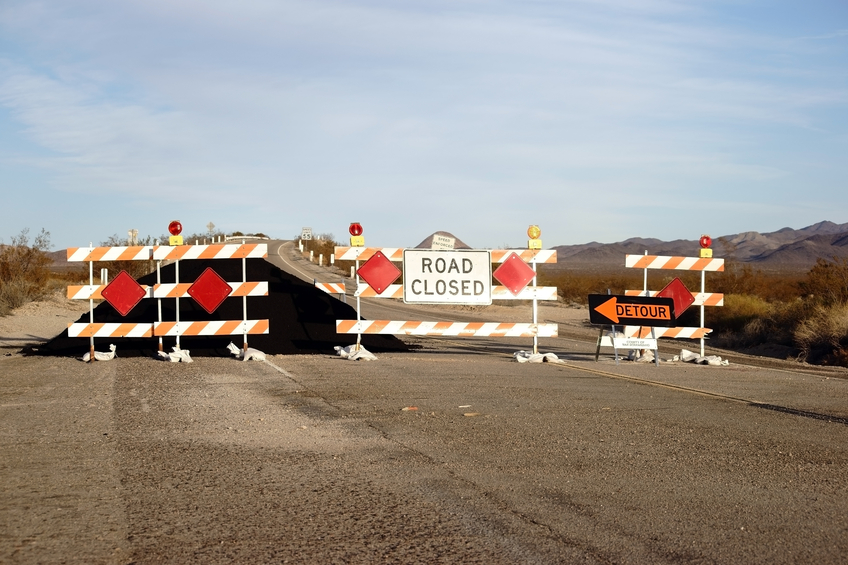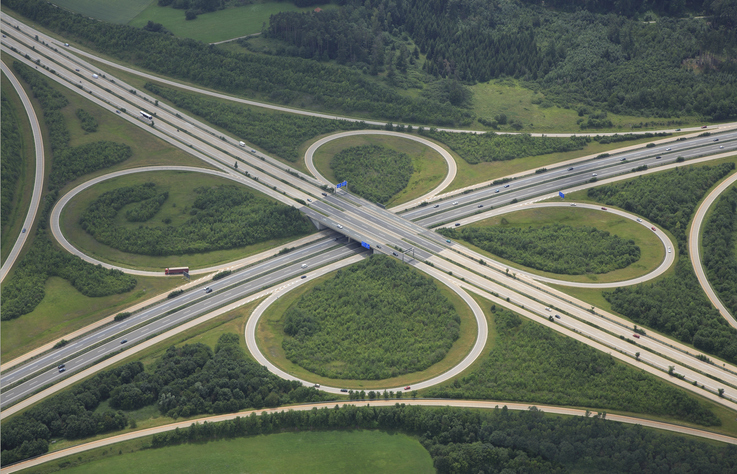Pennsylvania Transportation and Ethics 24 PDH Discount Package 1
Courses in this Package
Traffic Control Concepts for Urban and Suburban Streets (C07-004)
Transportation Management Plans for Work Zones (C07-001)
Roundabout Planning and Operation (C05-011)
Roundabout Traffic Design and Landscaping (C03-010)
Engineering Ethics for Pennsylvania Professional Engineers (PA2-001)

This online engineering PDH course discusses traffic control concepts for urban and suburban streets. In planning and designing a traffic signal control system, one must first understand the applicable operational concepts related to signalized intersection control and signal-related special control. A number of commonly used proprietary traffic systems and simulations are discussed in this chapter. These discussions provide illustrations of the technology.
This 7 PDH online course is applicable to transportation planners, traffic engineers, agency personnel as well as design and construction personnel involved with the development, review, approval, implementation, and assessment of traffic control planning, designs and implementation.
This PE continuing education course is intended to provide you with the following specific knowledge and skills:
- Understanding the various control variables
- Learning the sampling, filtering and smoothing techniques
- Knowledge of traffic signal timing parameters and signal phasing
- Dealing with isolated intersections
- Understanding arterial and network control and other special controls
- Understanding the benefits and measures of effectiveness
In this professional engineering CEU course, you need to review Chapter 3, "Traffic Control Concepts - Urban and Suburban Streets" of the Federal Highway Administration Publication, FHWA-HOP-06-006, "Traffic Control Systems Handbook".
Upon successful completion of the quiz, print your Certificate of Completion instantly. (Note: if you are paying by check or money order, you will be able to print it after we receive your payment.) For your convenience, we will also email it to you. Please note that you can log in to your account at any time to access and print your Certificate of Completion.

This online engineering PDH course sets forth some basic guiding principles and describes a general approach for developing, implementing, and assessing TMPs. This course is a compendium of guidance material, available resources, and suggested practices to help develop, implement, and assess transportation management plans (TMP) for work zones.
Work zone objectives, needs, and issues vary from project to project. Therefore, it is ultimately up to the professional to establish procedures and implement TMPs that best serve the safety and mobility needs of the traveling public, highway workers, businesses, and community.
This 7 PDH online course is applicable to transportation planners, traffic engineers, agency personnel as well as design and construction personnel involved with the development, review, approval, implementation, and assessment of TMPs.
This PE continuing education course is intended to provide you with the following specific knowledge and skills:
- Understanding the purpose of transportation management plans
- Learning the process for TMP development, implementation and assessment
- Knowledge of potential TMP components
- Implementing work zone impacts management strategies
- Familiarizing with current TMP use, examples and practices
In this professional engineering CEU course, you need to review the Federal Highway Administration Publication FHWA-HOP-05-066, "Developing and Implementing Transportation Plans for Work Zones".
Upon successful completion of the quiz, print your Certificate of Completion instantly. (Note: if you are paying by check or money order, you will be able to print it after we receive your payment.) For your convenience, we will also email it to you. Please note that you can log in to your account at any time to access and print your Certificate of Completion.

This online engineering PDH course presents the factors that lead up to the decision to construct a roundabout with an approximate configuration at a specific location, preceding the detailed analysis and design of a roundabout. By confirming that there is good reason to believe that roundabout construction is feasible and that a roundabout offers a sensible method of accommodating the traffic demand, these planning activities make unnecessary the expenditure of effort required subsequently.
This course also presents methods for analyzing the operation of an existing or planned roundabout. These methods allow a transportation analyst to assess the operational performance of a facility, given information about the usage of the facility and its geometric design elements. An operational analysis produces two kinds of estimates: (1) the capacity of a facility, i.e., the ability of the facility to accommodate various streams of users, and (2) the level of performance, often measured in terms of one or more measures of effectiveness, such as delay and queues.
This 5 PDH online course is applicable to traffic engineers, transportation planners, conceptual and detailed designers, and other technical professionals who are involved in the planning and operation of roundabouts.
This PE continuing education course is intended to provide you with the following specific knowledge and skills:
- Considering the various constraints for constructing a roundabout
- Determining a preliminary lane configuration and selecting a roundabout category based on capacity requirements
- Performing the analysis appropriate to the roundabout selection category
- Determining the space requirements and feasibility
- Understanding the traffic operations at roundabouts
- Obtaining data required to evaluate the performance of a roundabout
- Estimating the capacity of the various roundabout configurations
- Applying measures of effectiveness determine the performance of a roundabout and estimating these measures
- Familiarizing with the different computer software packages available to implement the capacity and performance analysis procedures
In this professional engineering CEU course, you need to review Chapter 4, "Planning" and Chapter 5, "Operation", of the Federal Highway Administration Publication FHWA-RD-00-067, "Understanding Roundabouts".
Upon successful completion of the quiz, print your Certificate of Completion instantly. (Note: if you are paying by check or money order, you will be able to print it after we receive your payment.) For your convenience, we will also email it to you. Please note that you can log in to your account at any time to access and print your Certificate of Completion.

This online engineering PDH course presents guidelines on the design of traffic elements, illumination, and landscaping associated with roundabouts.
The design of these elements is critical in achieving the desired operational and safety features of a roundabout, as well as the desired visibility and aesthetics.
This 3 PDH online course is applicable to traffic engineers, transportation planners, conceptual and detailed designers, and other technical professionals who are involved in the traffic design and landscaping of roundabouts.
This PE continuing education course is intended to provide you with the following specific knowledge and skills:
- Designing the traffic elements including signing, pavement markings and work zone traffic control
- Designing the required illumination
- Landscaping the central island, splitter island and approach
In this professional engineering CEU course, you need to review Chapter 7, "Traffic Design and Landscaping", of the Federal Highway Administration Publication FHWA-RD-00-067, "Understanding Roundabouts".
Upon successful completion of the quiz, print your Certificate of Completion instantly. (Note: if you are paying by check or money order, you will be able to print it after we receive your payment.) For your convenience, we will also email it to you. Please note that you can log in to your account at any time to access and print your Certificate of Completion.

This online engineering PDH course presents the laws and rules of ethics and professional responsibility governing the practice of engineering in the State of Pennsylvania. Excerpts from Pennsylvania ACT 367 as well as Chapter 37 of the Pennsylvania Code, which relate to the rules of profession conduct, continuing education requirements, proper use of seal and other pertinent regulatory provisions are presented in this course.
Engineering ethics is (1) the study of moral issues and decisions confronting individuals and organizations involved in engineering and (2) the study of related questions about moral conduct, character, ideals and relationships of peoples and organizations involved in technological development (Martin and Schinzinger, Ethics in Engineering).
This 2 PDH online course is applicable to Pennsylvania Professional Engineers who face different situations on daily basis while practicing engineering. This course will provide moral and ethical guidance to engineers in their decision making process. Most importantly, it will provide engineers with insight on how to respect and protect their profession with utmost professionalism.
This PE continuing education course is intended to provide you with the following specific knowledge and skills:
- Overview of the laws and rules regulating to the practice of engineering in the State of Pennsylvania and their application to Professional Engineers
- Understanding the roles of the Pennsylvania Board and its disciplinary authority
- Learning about engineering ethics and the rules of professional conduct and responsibility
- Understanding the continuing education requirements, proper use of seal and more in the State of Pennsylvania
- Understanding the Pennsylvania Board disciplinary process
- Review of the disciplinary cases and along the range of violations and corresponding penalties imposed by the Pennsylvania Board
In this professional engineering CEU course, you need to review the course document titled "Engineering Ethics for Pennsylvania Professional Engineers".
Upon successful completion of the quiz, print your Certificate of Completion instantly. (Note: if you are paying by check or money order, you will be able to print it after we receive your payment.) For your convenience, we will also email it to you. Please note that you can log in to your account at any time to access and print your Certificate of Completion.